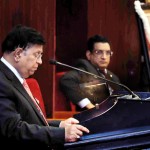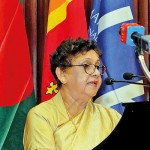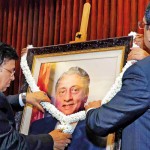News
B’desh FM calls for South Asian unity and holistic approach to prosperity
View(s):Bangladesh Foreign Minister A.K. Abdul Momen yesterday called on South Asia nations to come together and adopt a holistic approach to prosperity, given the multitude of challenges they are beset with.
Delivering the 2023 Lakshman Kadirgamar memorial lecture at the BMICH on Friday, he said a holistic approach to prosperity was necessary due to the compulsion of the contemporary evolution of the global order.
“We are now going through one of the most significant phases of human history having already experienced an unprecedented Covid-19 pandemic,” he said, speaking on the topic ‘Shared Prosperity: A Vision for South Asia’.
- Right: Bangladesh Foreign Minister A.K. Abdul Momen and Sri Lanka Foreign Minister Ali Sabry garlanding a portrait of the late Sri Lankan Foreign Minister Lakshman Kadirgamar. Above: Dr. Momen delivering the memorial lecture. Pix by M.A. Pushpakumara
- Mrs. Suganthie Kadirgamar delivering the welcome address: Right: a section of the audience
“Just as we showed our capacity to tame the pandemic, another challenge came our way – the armed conflict in Europe. This has not only slowed down our recovery from the havoc done by the pandemic but also caused a global economic recession due to an increase in energy and food prices and more importantly, disruption to the supply chain and financial transaction mechanism owing to sanctions,” he said.
Pointing out that developing nations had also become victims of power rivalry between big and emerging economies, Dr Momen, an economist cum seasoned diplomat, said these new challenges necessitated the developing countries to get together.
He lamented that within the existing frameworks, regional cooperation had made only limited progress, being hostage to political and security considerations.
“The problems have their roots in the historical baggage as well as the existing disparity in the regional structure. In addition, there are a number of outstanding issues and bilateral discords,” he said, adding that “one predominant characteristic is that our economies display greater interest in integrating with the global economy than with each other.”
He said these realities underscored the need for closer collaboration among neighbours setting aside differences and learning from each other.
The visiting foreign minister said Bangladesh was pursuing a foreign policy based on neighbourhood diplomacy for amicable political relations with its South Asian neighbours, while conducting a balancing act on strategic issues based on the philosophy of “shared prosperity”.
Bangladesh, within its limited resources, was always ready to stand by her neighbours in times of emergency, be it a natural calamity, pandemic or economic crisis, Dr Momen said, referring to humanitarian assistance his country extended to the Maldives, Nepal, Bhutan and India during the peak period of Covid-19 pandemic.
He also said that it was in keeping with its philosophy of helping the neighbours in crisis that Bangladesh sent emergency medicines to Sri Lanka during the crisis last year and agreed to the currency SWAP arrangement.
“These symbolic gestures were not about our capacity, pride or mere demonstration, rather it was purely about our sense of obligation to our neighbours. We strongly believe that shared prosperity comes with shared responsibility and development in a single country of a particular region may not sustain if others are not taken along,” he said.
An emerging region like South Asia needed to devise certain policies and implement those in a sustainable manner, he said sharing some of his thoughts which he said could be explored in the quest for shared prosperity and inclusive development:
“First of all, without regional peace and stability, we would not be able to grow as aspired for. To that effect, our leaders in the region have to work closely on a priority basis. We may have issues between neighbours but we have to transcend that to leave a legacy of harmony for our future generations so that a culture of peace and stability prevails in the region. We can vouch for it from our own experience.
“In Bangladesh, we are sheltering 1.1 million forcibly displaced Myanmar nationals. If remains unresolved, it has the potential to jeopardise the entire security architecture of South Asia. So, here the neighbourhood should support us for their own interests.
“Second, we need to revitalise our regional platforms and properly implement our initiatives taken under BIMSTEC (Bay of Bengal Initiative for Multi-Sectoral Technical and Economic Cooperation) and IORA (Indian Ocean Rim Association).
“Third, we need to focus on regional trade and investment. Countries in South Asia had implemented trade liberalization within the framework of SAFTA but on a limited scale. Bangladesh is in the process of concluding a Preferential Trade Agreement/Free Trade Agreement with several of its South Asian peers. We have already concluded PTA with Bhutan; are at an advanced stage of negotiations for PTA with Sri Lanka and discussions for PTA with Nepal are on. In the same spirit, Bangladesh is about to start negotiations on Comprehensive Economic Partnership Agreement (CEPA) with India.
“Fourth, a well-connected region brings immense economic benefits and leads to greater regional integration. To maximize our intra- and extra-regional trade potentials and enhance people-to-people contacts, Bangladesh is committed to regional and sub-regional connectivity initiatives. Bangladesh’s geostrategic location is a big leverage which was rightly picked up by our Hon’ble Prime Minister. She benevolently offered connectivity in the form of transit and trans-shipment to our friendly neighbours for sustainable growth and collective prosperity of the region. As for Sri Lanka, if we can establish better shipping connectivity which our two countries are working on, the overall regional connectivity would be more robust.
“Fifth, we live in a globalized world, highly interconnected and interdependent. Our region has gone through a similar experience and history. Bangladesh believes in and promotes religious harmony. We have been promoting a “Culture of Peace” across nations. The basic element of the “Culture of Peace” is to inculcate a mindset of tolerance, a mindset of respect towards others, irrespective of religion, ethnicity, colour, background or race. If we can develop such a mindset by stopping the venom of hatred towards others, we can hope to have sustainable peace and stability across nations, leading to the end of violence, wars, and terrorism in nations and regions. There won’t be millions of refugees or persecuted Rohingyas. Bangladesh takes special pride in it as even before Renaissance was started in Europe in the 17th century, even before America was discovered in 1492, in Bengal a campaign was started by Chandi Das as early as 1408 that says, “humanity is above all” and we still try to promote it.
“Sixth, we have to look beyond a traditional approach to development and challenges and revisit the non-traditional global crises of the recent time. We are experiencing food, fuel, fertilizer and energy shortages due to global politics and disruption of the supply chain; as littoral and island countries we face similar challenges of natural disasters; we have a vast maritime area which needs effective maritime governance; we need to curb marine pollution and ensure responsible use of marine resources. Our collective, sincere and bold efforts are required to minimize the impacts of climate change as well.”
Before he delved deeper into the topic of his lecture, the Bangladeshi minister paid tribute to Mr. Kadirgamar, whom he referred to as one of Sri Lanka’s finest sons.
“He was Foreign Minister during some of the most challenging times in your recent history. Still, he steadily moved towards achieving his dream to build a multi-religious and multi-ethnic united Sri Lanka where all communities could live in harmony. He was a legal scholar and a leader par excellence. He served to raise the level of the political discourse in
Sri Lanka, both at home and abroad.
Foreign Minister Ali Sabry in his welcome address recalled the efforts of the late foreign minister to end terrorism in the country and usher in peace. He said the war against terrorism was won not solely on the battlefields of the north and east. Sri Lanka’s steadfast foreign minister Mr. Kadirgamar in chambers, meeting rooms, and places all over the world fiercely fighting for Sri Lanka with world leaders and diplomats. “We cannot speak of winning the war without appreciating the critical role played by Honourable Kadirgamar,” he said.
He said Mr. Kadirgamar was more than just a warrior against terrorism. He was a unifier, a statesman who always sought to bring people together and find common ground.
Mr. Kadirgamar believed that the only way to defeat terrorism was to build a united and peaceful nation, Minister Sabry said, explaining Mr. Kadirgamar’s efforts at dealing with global challenges through unity.
“Long before the world learnt a bitter lesson from the Covid-19 pandemic, he foresaw that unless everyone is saved no one is safe. He was a true patriot who fiercely believed in a common Sri Lankan identity – the power of unity in diversity,” he said.
Mrs. Suganthie Kadirgamar giving the welcome address earlier said her late husband was a patriot who said no sacrifice was too great to preserve the unity of all the people in Sri Lanka and was a great believer in regional cooperation in the South Asian region.
Stressing the need for South Asian unity, Mrs. Kadirgamar also quoted from a speech of the late Minister who said: “Our cultures are interdependent, deeply common, historically old. The links between all seven of us are unfathomable. As ancient as they are, they are deeper than we think. Not only do we look alike, we speak languages that have remarkable similarities, our music is common, our culture is common, we are at home wherever we go in this great region of the world”.
The full texts of the speeches of the Bangladeshi and Sri Lankan foreign ministers
The best way to say that you found the home of your dreams is by finding it on Hitad.lk. We have listings for apartments for sale or rent in Sri Lanka, no matter what locale you're looking for! Whether you live in Colombo, Galle, Kandy, Matara, Jaffna and more - we've got them all!




